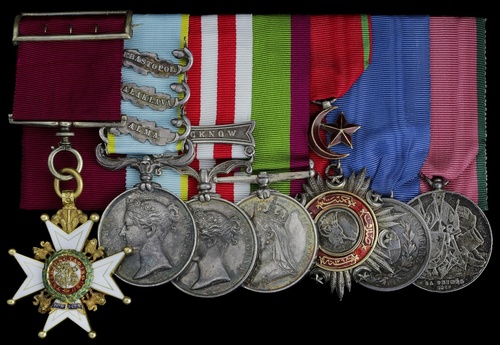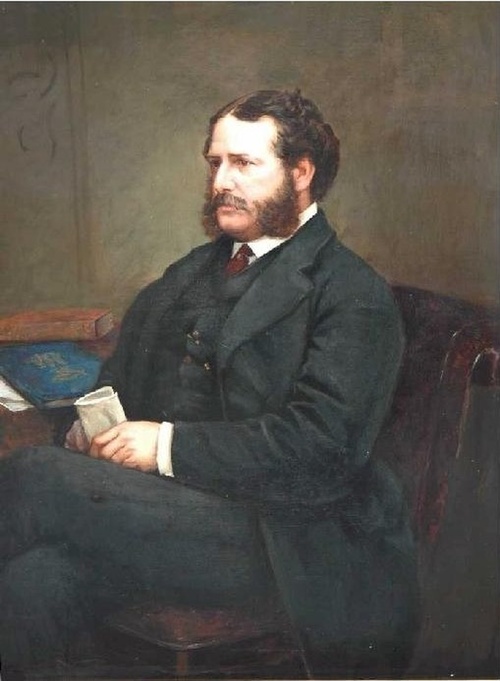Auction: 19001 - Orders, Decorations and Medals
Lot: 383
(x) The remarkable group of seven awarded to Major-General John Edward Michell, C.B., Royal Artillery; assigned to Barker's Battery for the Crimean War, Michell served with distinction at the Battles of Alma and Balaklava. During the famous 'Thin Red Line' incident on 25 October, Barker's Battery played havoc with Ryzhov's cavalry, receiving the special thanks of Sir Colin Campbell.
Four times mentioned in despatches for commanding 'E' Troop, Royal Horse Artillery during the Indian Mutiny, Michell took part in celebrated actions such as the storming of Meeangunge by Sir Hope Grant and the pursuit of Kunwar Singh to Azimghur.
He went on to command the Cavalry Brigade of General Maude's 2nd Division, Peshawar Valley Field Force during the Second Afghan War of 1878-80, mentioned in despatches for his services during the Bazaar Valley Expedition.
The Most Honourable Order of the Bath, C.B. (Military) Companion's breast Badge, gold and enamel, hallmarks for William Neal, London, fitted with narrow swivel-ring suspension and riband buckle; Crimea 1854-56, 3 clasps, Alma, Balaklava, Sebastopol (Capt. I. E. Michell, Royal Artillery), officially engraved by Hunt & Roskell in large serif capitals; Indian Mutiny 1857-9, 1 clasp, Lucknow (Major J, E, Michell, Rl. H. Art.); Afghanistan 1878-80, no clasp (Br. Genl. J. E. Michell. C.B. R.A.), minor official correction to surname; Turkey, Ottoman Empire, Order of the Medjidie, 5th Class breast Badge, silver, gold and enamel; Italy, Sardinia, Al Valore Militare, 1855-56 (Bt. Major J. C. Michell, Rl. Artry.); Turkish Crimea, Sardinian issue, replacement ball and ring suspension, the first extremely fine, the second with unofficial rivets between 2nd and 3rd clasps, very fine or better, mounted in court style by Spink & Son (7)
C.B. London Gazette 2 June 1869.
Order of the Medjidie London Gazette 2 March 1858.
John Edward Michell was born circa 1827 at Huish House, Langport, Somerset, the only son of Brigadier-General Sir John Michell, K.C.B., Royal Artillery. Young John entered Woolwich as a Gentleman Cadet on 11 May 1843, and promotion followed quickly. He was commissioned a 2nd Lieutenant in the Royal Artillery on 16 December 1846 (London Gazette, 23 December 1846), advancing to 1st Lieutenant the following September. Stationed at Gibraltar in 1847-48, where his father commanded the Garrison Artillery, he transferred to the Bermuda garrison in 1849. In August 1852 he was appointed to 'C' Troop, Royal Horse Artillery, then based at Leeds. On 18 March 1854, 'C' Troop sailed from Woolwich for the Crimean War, the first of the Artillery to embark.
Upon arrival at Varna, Michell was promoted Captain in No. 1 Company, 11th Battalion, Royal Artillery. On 22 July he left to join his new battery, Barker's 'W' Battery, which fought with distinction at the Battle of the Alma on 20 September. In a letter to his father, he recalled:
'We advanced up the road to the right and had some wonderful practice at the columns already in retreat: the new fuses and tubes worked admirably, and it was a sight to see the shrapnels bursting exactly over the poor devils.'
Upon arrival in Balaklava, Michell was involved in preparing the town's defences. On 23 October he wrote to his father:
'I am pretty hard worked, getting the artillery part of our position as strong as Sir Colin [Campbell] wishes. The enemy keep up a certain degree of excitement, hovering about nearly always in sight, but I don't think they have much mind to come on.'
Michell was soon disabused of this belief. At the Battle of Balaklava two days later, Barker's Battery was deployed to the left of the 93rd (Sutherland) Highlanders. It played a conspicuous role in the repulse of Ryzhov's cavalry during the action known as 'The Thin Red Line'. After engaging in counter-battery fire with Russian horse artillery, Barker's men wrought havoc among the Russian horsemen. Sir Colin Campbell was generous in his praise:
'I beg to call Lord Raglan's attention to the admirable conduct of Captain Barker, and the officers of the Field Battery under his orders, who made most excellent practice against the Russian cavalry and artillery while within range.' (London Gazette, 12 November 1854)
Michell was promoted to Brevet Major on 2 November 1855, receiving both the Sardinian Medal for Valour and the 5th Class of the Order of the Medjidie. He returned to England in June 1855, bringing back 122 invalids.
Mutiny Service
Michell then commanded 'E' Troop, Royal Horse Artillery during the Indian Mutiny. With 4 guns, 60 officers and men, and 166 horses, he took part in Brigadier Sir Hope Grant's storming and capture of Meeangunge, for which he was mentioned in despatches (London Gazette, 31 May 1858). He then joined the army besieging Lucknow, writing in another letter:
'Colonel Wood comes up to assemble his new brigade, to consist of 6 troops of Horse Artillery, and 4 field guns, a force which if well kept together and well handled ought to produce an effect somewhat Napoleonic.... I saw Sir Colin, who was very civil, remembering my face from Balaklava days.'
On 14 April 1858 Michell led the pursuit of Kunwar Singh's 13,000-strong rebel force to Azimghur on the Tons River. After a tense twelve-mile chase, Singh's rear guard was badly cut up by 'E' Troop's canister rounds, fired at point-blank range. Three rebel guns were captured. At Nathupoor Michell was reinforced by the 34th Foot, and Brigadier J. Douglas took over command. The combined force attacked a rebel stronghold at Azimutghur on 17 April, Michell directing the artillery bombardment. He was four times mentioned in despatches for his services during the Indian Mutiny.
Bermuda to Afghanistan
Promoted to Brevet Lieutenant-Colonel in April 1859, he commanded No.7 Company, 2nd Battalion, Royal Artillery, then stationed in Bermuda. Made a Companion of the Bath in 1869, he commanded the Royal Artillery at the Cape of Good Hope in 1871. Two years later he was appointed to 'A' Brigade, Royal Horse Artillery, stationed at Umballa, remaining in India for the rest of his active service. In 1877 he was involved in The Prince of Wales's visit to India, receiving the Empress of India Medal.
Promoted to Colonel on 17 April 1878, Michell commanded the Cavalry Brigade of General Maude's 2nd Division, Peshawar Valley Field Force during the Second Afghan War of 1878-80. The Brigade consisted of the 9th Lancers and the 10th and 13th Bengal Cavalry. Michell was mentioned in despatches for his part in the Bazaar Valley expedition (London Gazette, 7 November 1879), advancing to Major-General on 1 May 1880. He then went on a grand tour of Australia and New Zealand, inspecting gun emplacements.
Michell married Caroline Anne Stisted at St. George's Church, Hanover Square, London in December 1874. The same year he published a complete history of the Royal Horse Artillery, under the title Records of the Horse Brigade from its Formation to the Present Time (Boddy & Co., Woolwich). He died at Tunbridge Wells on 7 March 1883, leaving to his widow the sum of £10,106 14s. 6d., about £1,400,000 today; sold with a copy of J. A. Browne's book Three Distinguished Gunners (The Michells) and a file of research.
Recommended reading:
Browne, J. A., Three Distinguished Gunners (The Michells) (London, 1911).
Subject to 5% tax on Hammer Price in addition to 20% VAT on Buyer’s Premium. For more information please view Terms and Conditions for Buyers.
Sold for
£7,000







